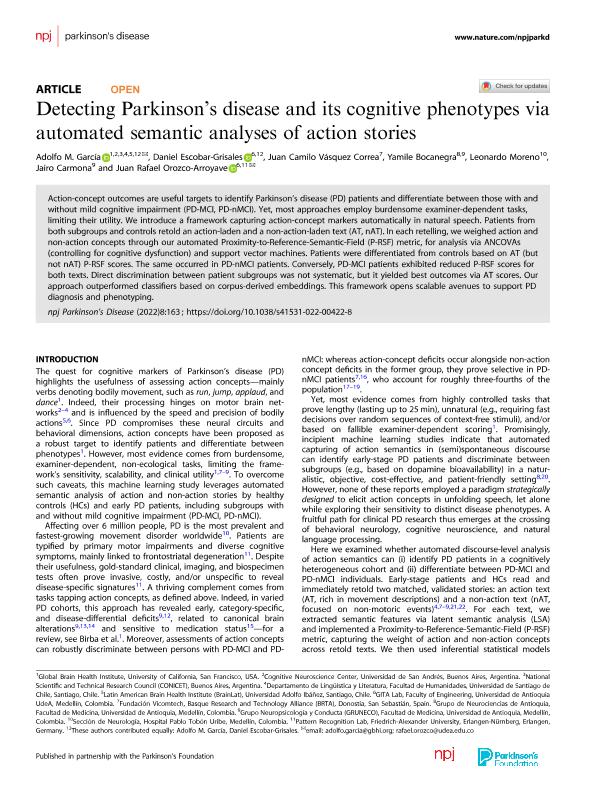Artículo
Detecting Parkinson’s disease and its cognitive phenotypes via automated semantic analyses of action stories
García, Adolfo Martín ; Escobar Grisales, Daniel; Vásquez Correa, Juan Camilo; Bocanegra, Yamile; Moreno, Leonardo; Carmona, Jairo; Orozco Arroyave, Juan Rafael
; Escobar Grisales, Daniel; Vásquez Correa, Juan Camilo; Bocanegra, Yamile; Moreno, Leonardo; Carmona, Jairo; Orozco Arroyave, Juan Rafael
 ; Escobar Grisales, Daniel; Vásquez Correa, Juan Camilo; Bocanegra, Yamile; Moreno, Leonardo; Carmona, Jairo; Orozco Arroyave, Juan Rafael
; Escobar Grisales, Daniel; Vásquez Correa, Juan Camilo; Bocanegra, Yamile; Moreno, Leonardo; Carmona, Jairo; Orozco Arroyave, Juan Rafael
Fecha de publicación:
10/2022
Editorial:
Nature Research
Revista:
npj Parkinson's Disease
e-ISSN:
2373-8057
Idioma:
Inglés
Tipo de recurso:
Artículo publicado
Clasificación temática:
Resumen
Action-concept outcomes are useful targets to identify Parkinson’s disease (PD) patients and differentiate between those with and without mild cognitive impairment (PD-MCI, PD-nMCI). Yet, most approaches employ burdensome examiner-dependent tasks, limiting their utility. We introduce a framework capturing action-concept markers automatically in natural speech. Patients from both subgroups and controls retold an action-laden and a non-action-laden text (AT, nAT). In each retelling, we weighed action and non-action concepts through our automated Proximity-to-Reference-Semantic-Field (P-RSF) metric, for analysis via ANCOVAs (controlling for cognitive dysfunction) and support vector machines. Patients were differentiated from controls based on AT (but not nAT) P-RSF scores. The same occurred in PD-nMCI patients. Conversely, PD-MCI patients exhibited reduced P-RSF scores for both texts. Direct discrimination between patient subgroups was not systematic, but it yielded best outcomes via AT scores. Our approach outperformed classifiers based on corpus-derived embeddings. This framework opens scalable avenues to support PD diagnosis and phenotyping.
Archivos asociados
Licencia
Identificadores
Colecciones
Articulos(SEDE CENTRAL)
Articulos de SEDE CENTRAL
Articulos de SEDE CENTRAL
Citación
García, Adolfo Martín; Escobar Grisales, Daniel; Vásquez Correa, Juan Camilo; Bocanegra, Yamile; Moreno, Leonardo; et al.; Detecting Parkinson’s disease and its cognitive phenotypes via automated semantic analyses of action stories; Nature Research; npj Parkinson's Disease; 8; 163; 10-2022; 1-10
Compartir
Altmétricas



